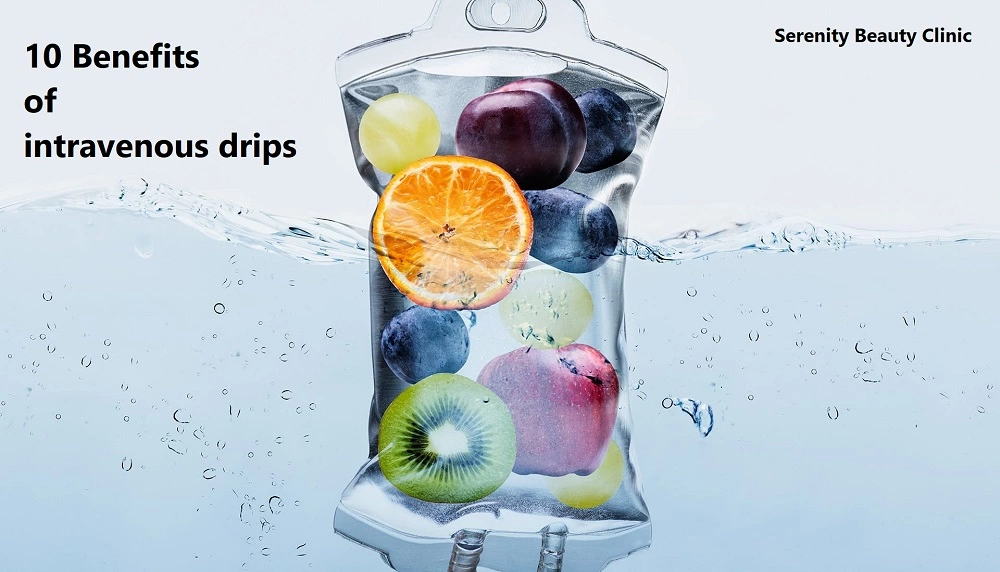Intravenous drips offer several benefits in medical treatment and patient care. Some of the key benefits include:
- Rapid Onset of Action: IV drips provide a direct route for medications and fluids to enter the bloodstream, bypassing the digestive system. This allows for a faster onset of action compared to oral medications, which need to be absorbed through the gastrointestinal tract.
- Precise Dosage Control: IV therapy allows for precise control over the dosage and infusion rate of medications or fluids. This is particularly important for medications with narrow therapeutic windows or when precise fluid balance is necessary.
- Increased Bioavailability: IV administration ensures that the entire dose of medication or fluid reaches the systemic circulation, resulting in increased bioavailability. This can be especially beneficial when a patient’s ability to absorb medications orally is compromised.
- Tailored Therapy: IV drips can be customized to meet specific patient needs. Healthcare professionals can adjust the composition and concentration of fluids, add medications or nutrients, and modify infusion rates to address individual patient requirements.
- Fluid and Electrolyte Management: IV drips are an effective way to restore or maintain fluid and electrolyte balance in patients with dehydration, electrolyte imbalances, or inadequate oral intake. They provide a controlled and efficient method of delivering fluids and electrolytes directly into the bloodstream.
- Emergency Access: IV drips offer immediate access in emergency situations, making them valuable for resuscitation efforts and rapid administration of life-saving medications or fluids.
- Symptom Control: IV drips can provide prompt relief of symptoms such as pain, nausea, or vomiting. Medications administered via IV can act quickly to alleviate discomfort and improve patient comfort.
- Continuous Administration: IV drips can be used for continuous administration of medications or fluids over an extended period. This is particularly beneficial for treatments that require a steady, continuous infusion, such as chemotherapy, antibiotic therapy, or intravenous nutrition.
- Flexibility and Adaptability: IV therapy allows healthcare professionals to adapt and modify treatment regimens based on a patient’s changing needs. The infusion rate, medication choices, or fluid composition can be adjusted easily to achieve optimal therapeutic outcomes.
- Monitoring Opportunities: IV drips provide an opportunity for close monitoring of patients. Vital signs, fluid balance, and response to medications can be closely observed during IV therapy, enabling healthcare professionals to detect and respond to any changes or complications promptly.
It’s important to note that while intravenous drips offer various benefits, they should be administered and managed by trained healthcare professionals following established protocols and guidelines to ensure patient safety and optimal outcomes.
Table of Contents
Benefits of intravenous drips for women
Intravenous drips offer several specific benefits for women in medical treatment and care. Here are five key benefits:
- Pregnancy and Labor Support: intravenous drips can be used to provide hydration, electrolyte balance, and medications during pregnancy and labor. In cases of prolonged labor or complications, IV fluids can help maintain maternal hydration and support the mother’s energy levels. IV medications may be administered for pain relief or to manage hypertension or other pregnancy-related conditions.
- Nutritional Support: IV drips can provide essential nutrients, vitamins, or total parenteral nutrition (TPN) to women who are unable to obtain sufficient nutrition orally due to conditions such as severe morning sickness (hyperemesis gravidarum) or gastrointestinal disorders. In some cases, pregnant women with certain medical conditions may require TPN to ensure adequate nutrition for both the mother and the baby.
- Postpartum Recovery: IV drips can be useful in the postpartum period, especially following cesarean section or significant blood loss during childbirth. IV fluids can help restore hydration, maintain fluid balance, and support the body’s recovery process after delivery.
- Gynecological Surgery: IV drips play a vital role in gynecological surgeries, including hysterectomy, pelvic floor repairs, or ovarian procedures. They provide hydration, medications such as antibiotics or pain relievers, and can help maintain hemodynamic stability during the procedure and postoperatively.
- Gynecological Cancer Treatment: IV drips are commonly used in the treatment of gynecological cancers, such as ovarian, cervical, or uterine cancers. Chemotherapy drugs or targeted therapies can be administered through IV infusions to deliver the medications directly into the bloodstream, allowing for systemic distribution and optimal therapeutic efficacy.
It’s important to note that the specific use of intravenous drips for women may vary depending on individual medical conditions, treatment plans, and healthcare provider recommendations. The administration and management of IV therapy should always be performed by trained healthcare professionals following established protocols and guidelines.
Benefits of intravenous drips for pregnant women
Intravenous drips can provide several benefits for pregnant women, particularly in situations where oral medication or hydration may not be sufficient or feasible. First and foremost, IV drips can help maintain adequate hydration levels in pregnant women. Pregnancy increases the body’s demand for fluids, and dehydration can lead to various complications, such as urinary tract infections, preterm labor, and decreased amniotic fluid levels. By delivering fluids directly into the bloodstream, IV drips ensure rapid rehydration, helping to prevent these issues and promote overall maternal well-being.
Furthermore, IV drips can be instrumental in providing essential nutrients and medications to pregnant women. In certain situations, such as severe morning sickness or hyperemesis gravidarum, oral intake may be challenging or ineffective. In such cases, IV administration of nutrients and medications can be a lifeline, ensuring that the mother receives the necessary nourishment and medications to support her health and the development of the fetus. This method bypasses the digestive system, allowing for direct absorption into the bloodstream and immediate availability for the body’s needs.
Overall, IV drips offer a reliable and efficient means of maintaining hydration, delivering nutrients, and administering medications to pregnant women, helping to mitigate potential complications and ensure optimal maternal and fetal health. It is important to note, however, that the specific use of IV drips should be determined by healthcare professionals based on individual needs and circumstances.

benefits of intravenous drips for men
Intravenous drips offer several specific benefits for men in medical treatment and care. Here are five key benefits:
- Fluid Resuscitation: intravenous drips are commonly used for fluid resuscitation in men experiencing severe dehydration, fluid loss due to trauma or surgical procedures, or those with conditions such as sepsis or shock. IV fluids quickly restore hydration and maintain fluid balance, helping to stabilize vital signs and improve overall well-being.
- Medication Administration: IV drips provide a direct and efficient route for administering medications to men. This is particularly beneficial for medications that require rapid onset of action, precise dosing, or are not suitable for oral administration. IV medications can be used to manage pain, treat infections, deliver chemotherapy, and address various medical conditions.
- Nutritional Support: IV drips can deliver vital nutrients, vitamins, or total parenteral nutrition (TPN) to men who are unable to meet their nutritional needs through oral intake due to conditions such as severe malnutrition, gastrointestinal disorders, or postoperative recovery. TPN provides essential nutrients directly into the bloodstream, supporting healing and overall health.
- Emergency Care: IV drips play a crucial role in emergency care for men. In situations such as trauma, cardiac arrest, or severe bleeding, IV access allows for the rapid administration of life-saving fluids, blood products, or medications. IV drips facilitate resuscitation efforts and help stabilize critical conditions.
- Support during Surgical Procedures: IV drips are commonly used during surgical procedures in men. They provide a means to administer anesthesia, maintain hydration and electrolyte balance, deliver medications, and support the body’s needs during and after surgery. IV therapy helps ensure optimal conditions for successful surgical outcomes and postoperative recovery.
It’s important to note that the specific use of intravenous drips for men may vary depending on individual medical conditions, treatment plans, and healthcare provider recommendations. The administration and management of IV therapy should always be performed by trained healthcare professionals following established protocols and guidelines.
Benefits of intravenous drips for older men
Intravenous drips can offer significant benefits for older men, particularly in situations where oral intake or medication absorption may be compromised. Firstly, IV drips can help maintain proper hydration levels in older men who may be prone to dehydration. Dehydration is a common concern among older individuals and can lead to a range of health issues, including urinary tract infections, constipation, and confusion. IV drips deliver fluids directly into the bloodstream, ensuring swift rehydration and helping to prevent these complications.
Secondly, IV drips can be used to administer medications directly into the bloodstream, bypassing the digestive system. This is particularly advantageous for older men who may have difficulty swallowing or absorbing oral medications. IV administration ensures that medications are quickly and effectively delivered, allowing for immediate therapeutic effects. This method also enables healthcare providers to closely monitor the dosage and adjust it as necessary, ensuring optimal treatment outcomes.
Overall, IV drips provide a valuable means of maintaining hydration and delivering medications to older men, addressing specific challenges they may face related to dehydration and medication absorption. However, it is important to note that the use of IV drips should be carefully evaluated and determined by healthcare professionals based on individual needs and medical conditions.



